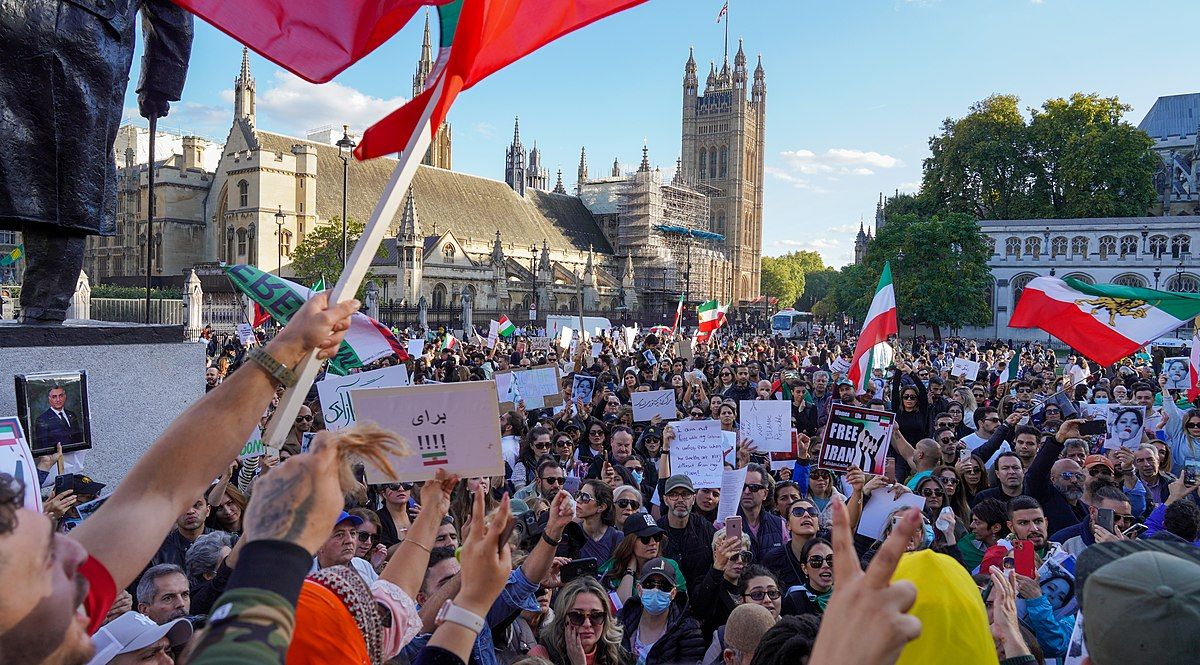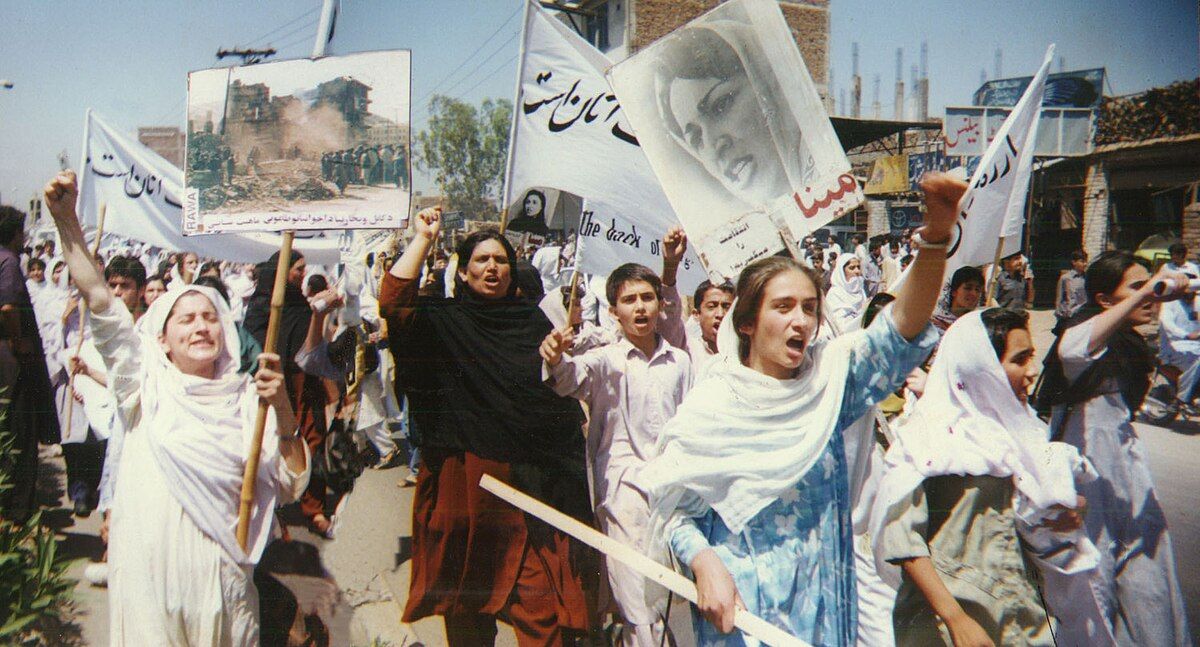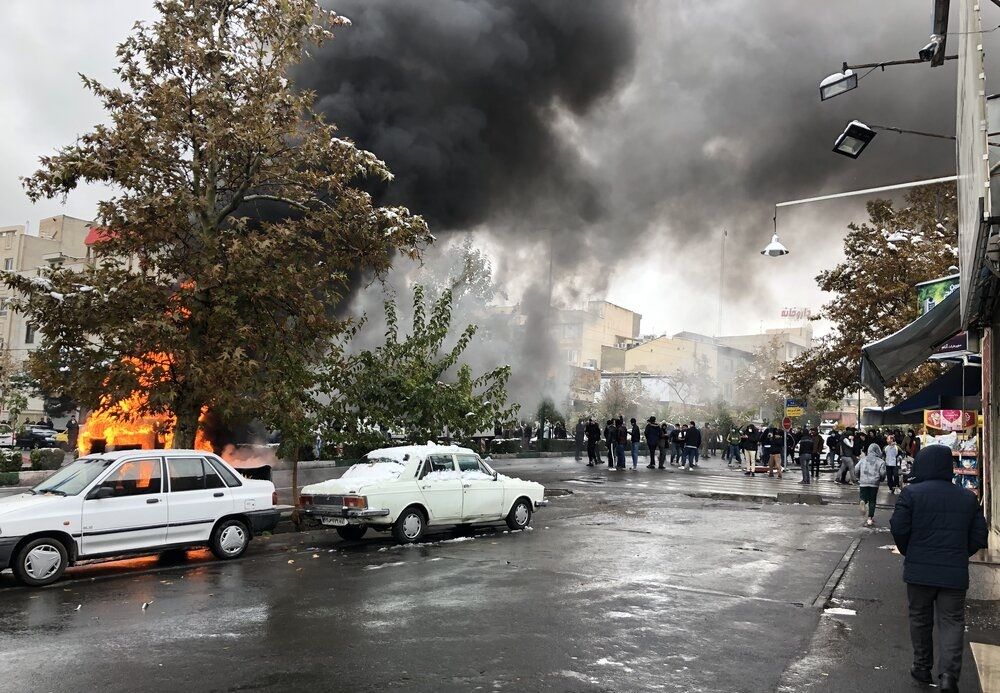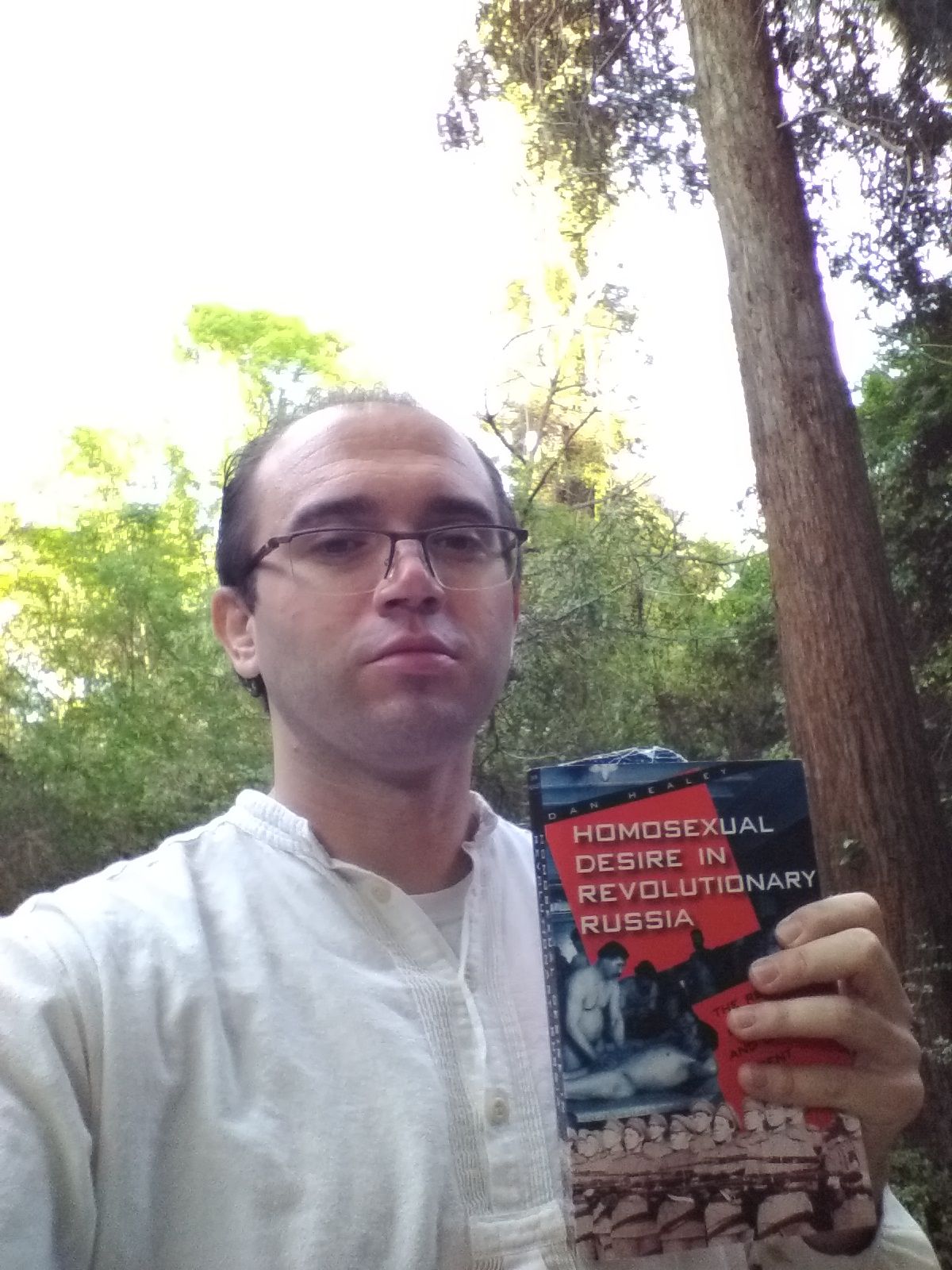The first part of this interview with Asra Anarchism was published in September 2022. In light of recent developments in Iran, we asked the group two further questions which immediately follow this introduction. The second part of the interview will then continue below that.
Please bear in mind much of this interview was translated by a third party and then edited for readability. Therefore, there may be slight differences to the original meaning.
In light of recent protests against the current regime in Iran, how do you view efforts aimed at international solidarity, considering how Middle Eastern and Muslim people are treated abroad?
Regarding the people’s revolution in Iran, the efforts for solidarity by the people, writers, artists, and intellectuals in the first weeks of the uprising, beginning in September 2022, were very encouraging. Still, these efforts could not reach a cohesive, or rather social, form. ٌWhat we mean by a social form is solidarity with people, collective approaches, participation in demonstrations, and even protest organisations by different communities across the world.
We feel there is a necessity for real solidarity so that radical political movements can actively fight against the Islamic Republic and other reactionary political forces affiliated with Western and Eastern governments and create an independent opposition. This opposition can shape the international social discourse and actions outside of Iran.
For example, the international anarchists sharing and allying with the positions of the anarchists of Iran and Afghanistan was very good and encouraging. And now, many of our comrades who have been active since the beginning of the protests and uprising are moving forward with us in many organising and activist spaces.
What we consider necessary is strengthening and spreading this atmosphere of action and solidarity as an international people’s opposition to the Islamic Republic and to the reactionary movements seeking to replace them.
What potential for revolution do you see in the recent protests?
The most important aspect of Iran’s uprising which will lead to a revolution is its egalitarian nature. This aspect has highlighted itself by demanding gender equality and the elimination of the oppression that the Islamic Republic has imposed on women. However, it does not end there, because the fight to eliminate gender oppression is only one part of the fight for equality. The noticeable phenomenon in this uprising is the breakdown of general demands into smaller and more detailed ones. These are smaller sections, all of which have arisen due to the inequality of the ruling patriarchal order. This order has arisen from the logic of government, a logic that has existed for years and is not limited to the Islamic Republic.
Therefore, the essence of the demands so far can be seen as a revolt against the whole social structure. The people will be able to change the entire unequal social order of the country by relying on what can be called the uprising against patriarchy, which has the most crucial revolutionary potential in Iran.

Nowadays, we see that people in Balochistan, Kurdistan, and Ahwaz, more than any other regions in Iran, are moving towards diversifying their slogans, gatherings, and also their role in determining social changes.
This is in response to the different religions and different languages that comprise these regions. For this reason, they have experienced different oppression and social exclusions caused by the monarchist and Islamic systems based on the above-mentioned differences. Only through such an uprising could these communities make themselves and their demands stronger than ever and into an effective political force for all of Iran.
This revolutionary process will soon consolidate itself with all its might. This process started from an uprising against gender oppression and became an uprising against all other existing oppressions. The realisation of the necessity of rising up against inequality is multiplying, as it makes itself recognizable and possible for all communities and social strata in Iran. This liveliness is a potential and an outstanding sign of the revolution!
Despite all this, we should not forget that the Islamic government severely suppressed the revolutionary movements and did not even allow the fortieth day after death ceremony to be observed for those murdered by the regime. The only permanent demonstration is still held every Friday in Balochistan, but it is met with severe repression. An unknown number of people have been arrested and injured there. Of course, in opposition to repressions, the people have also changed the form of struggle and revolutionary process for the time being. The cores of the resistance have been formed and continue their struggles covertly.
Today, more than four months since the revolt, people and their resistance groups need logistical support to continue and expand their activities. The fire of this revolt is still alive and strong. It is just momentarily under the ashes, ready to blaze out at the next opportunity. Everyone knows this. Reactionary forces are gearing up to steal the revolution; we must do the same to resist them and win the future.
What follows is the second part of the original interview questions.
How do you address the oppression of women and ethnic and religious minorities in Iran and Afghanistan? Does your work involve improving literacy and education among these and other groups?
The oppression that is applied to the women of Iran and Afghanistan is very widespread and systematic, and it has a specific legal form. Women, both within the family and in the community, and within the Islamic terrorist governments in Iran and Afghanistan, must be in constant conflict and struggle. Therefore, women themselves are on the front line of this fight against theocracy and religious tyranny.
The prevailing narrative of political Islam and fascism in the geography known as Afghanistan, which is regressive and extremist, does not recognize the rights of women or other minorities. Most of the extremist groups believe in the Taliban’s epistemology, a closed and dark world where the aliens must be killed and killing these aliens is considered Jihad (reward in this world and the hereafter), and the value of women is reduced to an object. For the Taliban, women are only creatures for reproduction.
For Islamic governments, cis and trans women are considered their first and main enemies, because most discriminations and oppressions are against cis women and transgender people due to their gender and sexual orientation. Their god is male and patriarchal, and all prophets, imams, and religious leaders are liars and religious charlatans. A woman has no political or religious leadership position. In Iran, women have been deprived of education in many sciences in universities, and in Taliban-ruled Afghanistan, they do not have the right to receive education beyond the sixth grade (approximately after learning multiplication and division and solving fractional problems). This is ideological and religious discrimination, and the continuation of women’s education in universities, if those universities are dependent on religious and security governmental institutions, will be prevented in many fields.
The nature of being heterosexual, whether from the point of view of sexual orientation towards the opposite sex or from the point of view of one’s own sexuality, outside of the traditional framework, is suppressed by the institutions of family, market, university, laws, and religious devotion. The LGBTQ+ community is ostracised by society, beaten and insulted, and personally assassinated or sentenced to death.
We see individual movement activity more than we have organisational activity. Due to security reasons and extensive repression, we focus more on individual movement activity in Iran and Afghanistan.
In Iran and Afghanistan, different people live with different native languages, cultures, and religions, but they are forced to study only in a common language and are deprived of the right to education in their mother tongue. This issue is not found within sections of anarchists or feminists.
Note that most of us anarchists of the Federation live in the so-called geography of Afghanistan and Iran and in religious and ideological societies. Because we are atheists ourselves (facing the sentence of apostasy and execution), this shows that we are facing different challenges and have to fight in a wide range of fields, despite in other ways being just like all the other anarchists around the world. We pay special attention to people’s struggles and global anarchist movements. We follow the world news every day, and as soon as protesters and anarchists enter the street protests, they get violently repressed. We will immediately try to inform and communicate closely with their anarchists, if possible, to help or support them as much as we can, considering that people outside of Iran and Afghanistan can be a part of the Federation as well.
Several weeks before the US withdrawal, the Federation had come to the conclusion that civil, social, and public activities were not possible in Iran. Therefore, we decided that the whole union should focus on Afghanistan and provide financial support for such activities so that it could expand. But unfortunately, the political events changed quickly and within eleven days of U.S. withdrawal, thirty-three out of thirty-four provinces, except Panjshir, fell into the hands of the Taliban. Then, the government handed over power to the Taliban.
What we think is important about Afghanistan’s geographical minorities is their genocide and the systematic removal of thousands. We are referring to the racism that has played out for years, where rulers and regimes based on the narrative of political Islam and fascism have been shedding thousands of people’s blood in different ways and for different reasons. Thousands of lives will soon be destroyed due to a lack of external support and due to the differences of religion. How many educational institutions, schools, nurseries, wedding halls, and sports clubs belonging to the Hazara (a long persecuted ethno-religious minority) are being purposefully blown up and destroyed? Members of this minority are deliberately shot on the highways, and their civil protests are violently and finally destroyed with bombs and horrible explosions. In summary, the history of Afghanistan is witnessing the worst behaviour of autocratic rulers against thousands of people, and it continues today.
Therefore, Afghanistan’s Hazaras and federalists can be considered a potential partner for the anarchist project.
Is armed struggle feasible in Iran and Afghanistan?
In general, yes. There is an armed struggle in both Iran and Afghanistan, but it faces serious limitations. If there is money, it is possible to buy access to weapons in Afghanistan. Also, because of the more than four war zones in Afghanistan, there is a possibility of supplying weapons. On top of this, the existence of the Hindu Kush mountains and the rugged nature of Afghanistan provide a natural condition for the presence of armed forces and guerrillas. Even if Iran is considered geographically similar to Afghanistan, its elevation is not as high as the mountains of Afghanistan, and the entire geography of Iran is not considered mountainous like its neighbour.
In Afghanistan, since August 15, 2021, when the Taliban occupied Afghanistan, the armed struggle by the forces and supporters of the National Resistance Front led by Ahmad Massoud began, and several other military fronts have been formed as well.
We anarchists also examined the possibility of creating an independent armed force before the fall of all thirty-four provinces of Afghanistan. However, we did not have the financial capability, we did not have the weapons, and our force was very small and limited, so we did not have the possibility of confrontation and war on two fronts.
There have been more than four wars in Afghanistan since 1979, and in general, a section of the people are tired of war. The Taliban, however, who use the force of war, weapons, and terrorist operations, and by suicide explosions, and killing women, children, and ordinary people, come to negotiate and agree with governments. There is no other way to combat this except war and armed resistance.
A group that is going to start an armed war needs people to stand by it, that is, to have the support of the people. Second, like the authoritarian groups such as the Taliban, we must also have the support of a foreign country, for ammunition and other things. This issue is also true for Iran. Iraqi Kurdistan is sometimes controlled by several Kurdish armed groups.
Anarchists in Iran have a social structure of support, but they do not have the necessary weapons and facilities. The existence of laws in Iran that can turn even a small fruit knife in a pocket into a cruel sentence of several years in prison has inhibited the carrying of firearms and the smuggling of them to different key regions.
Many collective efforts in this direction have led to failure, but still, in different and new ways, the general public is trying to obtain weapons. This general and all-round desire for arming oneself in Iran without any restrictions and conditions is intensified by the all-round massacres of the people of Iran by the government. More than 6,000 deaths were documented in just one province in November 2019.
Of course, it is obvious to us that the armed struggle must also be carried out using anarchist tactics and philosophy, that is, with decentralisation, will and antagonism toward the aim of destroying the powerful forces of the enemy.
How can anarchists in the Middle East resist the authoritarian revolutionaries like Daesh (the Islamic State), who are pushing for the establishment of a caliphate in the borders?
When we talk about the Middle East, it is not clear exactly which countries and geographical regions it includes, and we are faced with different names, but apparently there are 18 countries in the Middle East. Iran is located in the Middle East and Afghanistan, like Pakistan, is in South Asia. Therefore, to answer this question, more than just the Middle East should be examined.
Let's review some currents by name: the Taliban of Afghanistan and the Taliban of Pakistan (Tehreek-e Taliban), plus Daesh in Afghanistan, Syria, Iraq, Libya, Nigeria, and in some countries of Southeast Asia. As well as the Taliban and Daesh, of course, there are currents of Islamic extremism in Andhra Pradesh, the State in India. There are Islamists like al-Shabaab, Boko Haram and Ansar al-Sharia in Africa, plus al-Qaeda, Hizb al-Tahrir and hundreds of other Islamist terrorist groups.
We have a government in Iran that is similar to the Taliban and Daesh. According to the people of Iran in cyberspace, we have faced a combined Taliban and Daesh government in Iran for 34 years before Daesh, and we are still confronting this terrorist Islamist government.
The first terrorist act of the current rulers of Iran towards the people was the burning of Rex Abadan cinema, which happened six months before the revolution of 1979. As many as 776 people were killed. The main instigators of the burning of Rex Abadan cinema after the revolution were the representatives of the Islamic Republic Council.
According to the Doha agreement with the Taliban and the U.S. government, the Taliban inherited power from America and the West within 11 days and occupied Afghanistan starting in August 2021. In short, the Taliban has taken the people of Afghanistan hostage. During this time, Talibs have committed countless crimes and have been increasing the restrictions for women, practically sequestering them in their homes. Basically, Islamists consider women and transgender people their first enemy, and most of their laws are against these two groups.
We, the anarchists, women, queers, and atheists, are actually on the front line of the fight against Islamist terrorists like the Taliban in Afghanistan and the clerics in Iran who have taken political power and applied their Sharia and patriarchal laws.
In the Middle East and in all Islamic countries, based on Sharia, we have to fight on several fronts at the same time. Anarchists in areas where Islamist terrorists are either in power or trying to reach power should count women, queers, atheists and freedom seekers as their allies. In addition, we should encourage the growth of anarchism in these societies and at the same time welcome the help of anarchists around the world.
What are some of the organisational challenges you face at the international level? Do you see the end of sanctions on Iran and Afghanistan as an opportunity for intercultural encounters?
Perhaps the issue can be divided into several sections:
1) One of the organisational challenges at the global level is that most of the activities of anarchists are secret in many countries, and due to security reasons, it is not possible to exchange our experiences publicly by projecting them into the virtual space of the movement. This would not be constructive. On the other hand, in many geographical areas the level of oppression is different, the organisational methods are different, and there is a different understanding of the level of oppression between different societies, and the situation of survival.
2) The issue and problem of language is that it limits global communication unintentionally. This problem of a lack of a common language is one of the obstacles to the exchange of more and more experiences of struggle that can promote global self-organisation.
3) There is also the difference between societies in terms of the type of government and the quality and quantity of dictators; the political, social, cultural, religious, geographical and climatic differences; and the difference of societies in terms of the economy and the level of welfare or the poverty of societies. The possibility of self-organisation at the international level faces these challenges.
4) The structure of the institutions of power and the methods of repression are different in different States; therefore, this also makes the possibility of self-organisation across borders difficult.
5) Government lobbies abroad, their propaganda, and cyber devices have the possibility to target anarchists all over the world, however indirectly, in cyberspace. For example, following the fallacy that ‘there is imperialism only in America,’ some anarchists gave up the fight against all other imperialist and micro-imperialist states, or even supported or guarded silence about the Islamist governments and Islamic currents that were using supposedly anti-imperialist and anti-American slogans. Or, by referring to the excuse of “Islamophobia,” they would refuse to join us when we were fighting theocratic governments like the Islamic Republic of Iran and the Taliban of Afghanistan. Sometimes, they would even refuse to publish our comments or content on their websites.
6) It is the system of State borders, which practically makes it difficult for many people from poor countries or countries without “valuable” passports to make direct contact with anarchists abroad.
7) Not having comprehensive media such as satellite TV reduces the coverage of self-organisation at the international level, and we have the fewest media tools compared to government media. For example, the Islamic Republic of Iran is trying to cut off people's access to the international internet and has fully prepared the necessary infrastructure for this.
8) Lack of financial opportunities can play an important role in the field of international organisation. Despite all these problems, the international anarchist movement has an acceptable track record and has worked very successfully. This is because a part of the politics of their world struggles is enacted on a daily basis, that is, the priority is with the people's struggles every day. When in every part of the world, people are on the streets and are fighting against a government, all the anarchist movements are there in spirit and are focused on those people's struggles and anarchists' struggles. In fact, anarchists are the only political actors who really prioritise internationalism and act on the basis of “one world, one struggle,” like a complex but unified system.
This is the same in the virtual space as well. In fact, anarchists support each other in every possible way. To give an example, our content, which is in Farsi (Persian), is mostly broadcast by international anarchist comrades. As a result, apparently, it has an international audience larger than the people who know Farsi.
After the Taliban retook control of Afghanistan, the international anarchists did not hesitate to provide financial assistance so that we could evacuate some of our comrades from Afghanistan. So many interviews were done with us when we were busy leaving, and they contacted and helped us so much that we really did not find the ability to answer, translate and answer all the interviews.

International anarchist comrades regularly translate our content into different languages and post it on their websites.
Regarding international sanctions, first of all, it should be said about the role of the lobbies of the Islamic Republic of Iran and the Afghan Taliban abroad that they are present “everywhere.”
In particular, the Islamic Republic has sent its forces abroad to lobby for it during these 34 years. The clerics of the Islamic Republic of Iran want to promote the political line of their theocratic government by influencing the media, newspapers, parliament, political parties, world scientific and university societies, human rights societies, etc. One of these issues is the discussion of sanctions, and the main benefits of lifting sanctions would be for the terrorist states of the Islamic Republic of Iran, the terrorists affiliated to the Guards Corps of the Islamic Republic of Iran, and the terrorist Taliban in Afghanistan. Another example is the attempt to gain official recognition of the Taliban through their international agents. Of course, these lobbyists have many duties and receive a lot of money from the Islamic Republic.
Whenever the sanctions of the Islamic Republic of Iran have decreased, this has led to greater profit to finance this state's terrorism across the globe, or it has strengthened its religious and economic reach in the world, to meet its goals of converting more people to Shi’ism to launch an Islamic revolution, or of simply suppressing the peoples of Iran, Iraq, and Syria. In this way, practically cancelling the sanctions only increases the risk of suppressing the people of the region.
In your founding manifesto, Federation of Anarchism Era explicitly disavows ‘religious anarchisms.’ What is the context of why you adopt political atheism as a political line? To what degree do prophetic visions of the future drive politics in the Middle East, and how can anarchists reframe these concerns or desires to promote an anarchist future? What role does culture (music, theatre, art), primary targets of destruction by groups like Daesh, play in your anarchism?
The issue of religion is very important. In some regions, the people have been alienated from religion and it has no appeal for them. A real alternative that intends to overthrow the government therefore cannot be like its opposition. We are against political Islam and Islam in power, and we also think that religion has negative effects on everything. This is because the government rests at the top of a pyramid which should be inverted, and the laws that should be earthly have become contaminated with reactionary religious thoughts and delusions.
Besides, any anarchist tendency can be present in the federation, except a tendency antithetical to anarchism. It is not possible for a person to have a religious attitude and another to have an anti-religious attitude, because they will not reach any common point and they will always be in conflict with each other.
In the Middle East and its surrounding countries, there are great differences among societies. In some societies, religion has the upper hand and religious power is dominant, but in others, the majority are not religious. For example, religion in Afghanistan is much stronger than in Iran. Therefore, societies in the Middle East and South Asia can be divided into two groups: societies where religion and religious thought play the main role, and societies where religion is unlikely to play much of a role in its political future. Anarchists in the Middle East play a different role. In some geographical areas such as Iran, anarchists have a social body, but in smaller countries in the Middle East, the number of anarchists is few. It goes without saying that we do not limit our field of activity to Iran or Afghanistan and we seek to strengthen anarchism, especially in the Middle East.
In relation to art: Taliban, ISIS (Daesh), and other Islamic religious forces are fundamentally opposed to music, theatre and art, just as music was forbidden in Iran for several decades after 1979. At first, underground music was performed, and this practice continues, because music is also under the control and censorship of Iran’s theocracy.
Like books, music and art, theatre is under the supervision and censorship of the Islamic government of Iran. Anarchism in Iran and Afghanistan entered society mainly through art and artists.
Finally, the main reason for anarchists' confrontation with religion is due to its systematic rules and views of society. The ideology of religion, like the ‘nation-state,’ is completely centralised and calls for the usurpation of individual and even social will for the benefit of the ‘greater good,’ that is, the ‘religion-nation’ system.
A part of Afghanistan's society is religious, and a large part of it is disgusted and hates religion. This is because the wars and bloodshed, destruction and our withdrawal from Afghanistan have their roots in religion and political Islam. Those who are harmed by and hate religion, fearing the consequences of dynastic power and xenophobic reactions, cannot speak of it. The few who do are cursed and blasphemed by the religious founders, and if not outright assassinated, they are arrested or executed by the religious rulers. The Taliban regime executes even the most ordinary person on the charge of violating and criticising their self-defined Islam without trial.
Oh, how the soldiers whip groups of people for the crime of not praying, and even shot a young man in Ghazni province for the crime of fasting, without trial! Of course, these were only small samples that we noticed. With a few differences, this situation is generalised in Iran's society and regime. The harsh behaviour of religious representatives and governments, which has enslaved the people in the literal sense of the word (such as through the mandatory hijab of women or the mandating of long skirts and facial hair) are the cause of increasing hatred.
According to Herbert Reed, an anarchist poet and writer, ‘if you do not provide your society with a new religion, it will gradually revert to the old one.’ There is a need for another idea to be presented to society instead of political Islam, and it will be a good ground to attract the masses.
Authoritarians, nationalists, and clerics want to bring the world and the people under the rule of their intellectual system. Of course, they do this with political tricks and in most cases by resorting to force and coercion. The only defence against this bullying is anarchism, which can be achieved with an intellectual and social revolution and a freeing of society from the evil of this tyranny.

What advice would you offer to those trying to create a group like your own?
Our situation has its own intricacies, characteristics, and conditions that have been imposed on us. Our dispersion in different countries and continents is one of these characteristics.
Our second characteristic is that we come from repressive Islamic countries, and we have a lot of experience in dealing with systematic oppression. Even abroad, there is the risk of terrorism by the Islamic Republic of Iran, being killed outside of the country, the risk of kidnapping and taking us to Iran or prison, and the possibility of execution in the countries around Iran by Iranian spies. There is also the constant risk of hacking and espionage. There is information about the Islamic Republic of Iran operating by using technology abroad, like the recent discovery of the government spying on opponents abroad using Dutch servers.
We are a group that can cooperate with all anarchist tendencies except for those who advocate pacifism, capitalism, religion, or nationalism. This is because conflicting political ideas cannot cooperate with each other. For example, religion is not compatible with atheism. We went through each of these tendencies before arriving at where we are today.
The creation and organisation of an anarchist group should be proportional to the geographical-political region and the amount of oppression, the type of oppression and the level of life risks. Respecting security issues is important under all conditions and in every geography, and the influence of police should be taken care of. If you want to prevent their penetration, it is necessary that you quietly attract the required number of people and choose those people yourselves. When the required force is provided, stop and think more about influencing the anarchist movement and related movements rather than expanding your organisation. Your activity must be focused on the goals of the movement.
It is better for your media to be established in other countries, preferably in other continents that do not have a good relationship with the country you are considering. Although there is a risk of hacking and cyber-attacks, or of information being lost between states, it is important that key information is not exchanged online.
Being a part of organisations in different countries reduces vulnerability in the country of origin and can increase the level of struggle, diversity and expansion. The anarchist movement can benefit from the experience of global forces and attract the support of the global movement.
Do you want to add something that we haven't covered?
Due to security reasons, we could not answer your questions as clearly as we should, considering that only in Iran, we have to deal with 16 intelligence-security institutions. This is in addition to the Taliban’s intelligence agency.
The growing fear of the Taliban caused serious changes to our plans. Among them, many interviews were conducted with us when most of the members of one of the countries that make up the Federation of Anarchists of Afghanistan and Iran were displaced and the Federation still had 9 months for them to leave Afghanistan.
We would like to thank all the anarchist comrades of the world who helped us financially so that we could help comrades from Afghanistan escape, and of course we did not think that the withdrawal of the comrades would take so long. We thought that we would be involved for about six months, but still more of our comrades in Afghanistan, Iran, and Pakistan need to get abroad, and we will need financial help and support from our comrades. Since the war in Ukraine escalated, the plan to leave Afghanistan and transfer them to safe countries is no longer on the agenda or a priority. Therefore, the issue of ensuring the safety of our comrades may take several years, depending on the situation in Ukraine. In general, as a strategy, we anarchists should be able to be in close contact to establish communication between continents.
Thank you very much for your cooperation in conducting the interview.
Special thanks to our current patrons, who make everything we do possible:
Mr Jake P Walker, Aryeh Calvin, Meghan Morales, Kimonoko, Joshua Akapo, Diana Rahim, Chaotic Capybara, Christian Kennedy, Cy.Maggran, Bogdan Ovodiu Gheorghiu, La Val, Paul Treadwell, Alex Paterson, Loke, Ben Dunn, Barry, Nothing, Manic Maverick, Vervain, and Kevin Atkinson.
If you'd like to support out work, please consider becoming a Patron:




